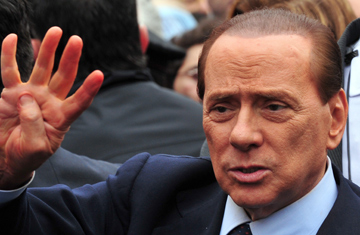
Italian Prime Minister Silvio Berlusconi acknowledges supporters as he leaves after for a legal hearing over allegations of fiscal fraud and breach of trust in his business interests on March 28, 2011 at Milan's justice court.
There were no reporters allowed when Silvio Berlusconi appeared before judges and prosecutors on Monday. But that didn't much matter, because while the Italian Prime Minister was inside attending court for the first time in eight years, he made sure that most of the action happened outside.
Photographers greeted the premier's motorcade with long bursts from their digital cameras, and after the hearing was over, Berlusconi paused amidst a throng of reporters to wave to supporters chanting his name. That morning, a little more than an hour before his court appearance, the prime minister called into one of the television channels owned by his media company to denounce the charges against him as politically motivated accusations. Left-wing prosecutors, he said, are seeking to keep a "judicial Sword of Damocles" hanging over his head. "It was a sort of defense peroration without anybody from the prosecution to cross-examine him," says James Walston, a political scientist at the American University of Rome. "Whatever happened in court, what remains in the public eye is his appearance on television and his supporters cheering outside the courthouse."
On the TV show, Berlusconi used the case against him to make the case against his foes, claiming that the fraud charges are the 25th trial he has faced since becoming prime minister in 1994, a time period during which he says he has survived 2,564 hearings without ever having a conviction stick. "I'm the most accused man in the history of the universe," Berlusconi told the show's host, Maurizio Belpietro, editor of a right-wing paper. "Communism in Italy never changed. There are still those who use the penal code as in instrument of ideological struggle."
The court appearance itself involved a procedural hearing on allegations that the prime minister committed tax fraud and embezzlement up until 2006, during the acquisition of film rights by his media company. Prosecutors allege that executives at one of Berlusconi's firms used a series of front companies to jack up the cost of film rights for U.S. movies, with the prime minister pocketing the difference. But while Berlusconi has indeed never been definitively convicted, he has escaped several charges through the expiration of the statute of limitations and by passing laws his opponents say were changed to free him of his legal woes. Monday's charges are part of just one of four trials Berlusconi has been forced to face after the country's constitutional court struck down a law in January that had granted him immunity while in office. The hearing comes just over a week in advance of the highly anticipated start of another trial, in which Berlusconi stands accused of paying an underage prostitute for sex and abusing his office to cover it up.
According to Robert D'Alimonte, a professor of political science at Rome's LUISS University, the prime minister's rare decision to stand before the judges on Monday — in Italy, defendants are not required to attend hearings — shows that he feels he has regained his political footing after a long year in which he fell out with his closest political ally and weathered a storm of embarrassing revelations, including accusations he hosted "bunga bunga" sex parties with young women dressed as nurses and police officers. "The advantage for Berlusconi is that he has no credible opposition," says D'Alimonte. "There's no alternative coalition. The opposition is in disarray."
Though Berlusconi's poll numbers have suffered in recent weeks, he retains a slim control in parliament, which is moving forward on passing new sets of laws that his opponents again say will free him from some of his trials. Being seen as cooperative on relatively unimportant hearings like Monday's is likely to give Berlusconi leeway with the public if he fights back on others, especially with those who agree that he's being persecuted. "A lot of Italians now are convinced that he is a victim of a judicial persecution," says D'Alimonte. "He can show his public he's not fearful of going to court, that he's a law-abiding citizen of the system, that he's a victim of the system, but he doesn't want to duck it." And then it might not matter just what happens behind closed doors.
